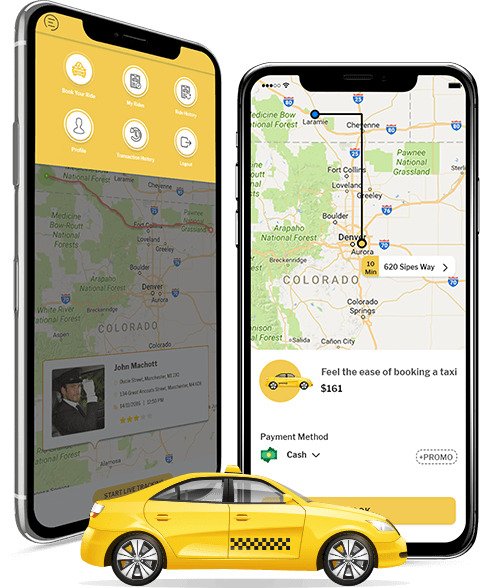The taxi app industry has grown dramatically over the last decade, driven by technological advancements and increased demand for quick, efficient transportation alternatives. Among the technological advancements, artificial intelligence (AI) stands out as a disruptive force potential to revolutionize the landscape of taxi app business models. AI’s capacity to analyze massive quantities of data, learn from patterns, and make intelligent judgments has the potential to significantly enhance many elements of the taxi app development services. In this thorough examination, we will look at the multiple influences AI will have on the future of taxi app business models, including customer experience, operational efficiency, safety, and strategic decision-making.
Enhancing Customer Experience
Personalized Ride Experiences
AI algorithms can analyze customer preferences, travel history, and feedback to offer personalized ride experiences. For example, AI can recommend preferred routes, suggest frequently visited destinations, and even customize the in-ride environment (e.g., music, temperature) based on individual preferences. This level of personalization can enhance customer satisfaction and loyalty, making users more likely to choose a particular taxi app over competitors.
Dynamic Pricing
AI-driven dynamic pricing models can adjust fares in real-time based on factors such as demand, traffic conditions, and availability of drivers. This ensures that pricing remains competitive while maximizing revenue for drivers and the platform. By offering transparent and fair pricing, taxi apps can attract more users and retain existing ones.
Predictive Maintenance
AI can predict when vehicles are likely to require maintenance based on usage patterns, driving behavior, and historical data. By proactively scheduling maintenance, taxi apps can minimize downtime, reduce unexpected breakdowns, and ensure a smoother and more reliable ride experience for customers.
Optimizing Operational Efficiency
Intelligent Routing and Dispatch
AI-powered routing algorithms can optimize routes for drivers, reducing travel time and fuel consumption. By analyzing real-time traffic data, weather conditions, and historical patterns, AI can suggest the most efficient routes. Additionally, intelligent dispatch systems can match drivers with passengers more effectively, minimizing wait times and maximizing the number of rides completed per driver.
Fleet Management
AI can optimize fleet management by analyzing data on vehicle utilization, driver performance, and maintenance needs. This allows taxi app operators to manage their fleets more efficiently, ensuring that vehicles are available when and where they are needed most. Improved fleet management leads to cost savings and better service availability.
Demand Forecasting
AI can accurately predict demand patterns based on historical data, events, and external factors such as weather or holidays. By understanding when and where demand will be highest, taxi apps can strategically position drivers to meet demand, reducing idle time and ensuring a steady flow of rides. This not only improves operational efficiency but also enhances driver earnings and customer satisfaction.
Enhancing Safety and Security
Driver Monitoring and Behavior Analysis
AI can monitor driver behavior in real-time, analyzing factors such as speed, acceleration, braking, and adherence to traffic rules. By identifying unsafe driving practices, AI can provide feedback to drivers and offer training or incentives to improve their driving habits. This leads to a safer ride experience for passengers and reduces the risk of accidents.
Incident Detection and Response
AI can detect incidents such as accidents, breakdowns, or passenger emergencies in real-time. By leveraging data from sensors, cameras, and other sources, AI can alert the relevant authorities and initiate a rapid response, ensuring the safety and well-being of both drivers and passengers. This capability can significantly enhance the trust and reliability of taxi app services.
Fraud Prevention
AI can analyze transaction data to identify and prevent fraudulent activities, such as fake rides or payment discrepancies. By continuously monitoring patterns and anomalies, AI can flag suspicious behavior and take preventive measures, safeguarding the interests of both customers and the platform.
Strategic Decision-Making
Market Analysis and Expansion
AI can analyze market trends, customer demographics, and competitor strategies to provide valuable insights for strategic decision-making. This enables taxi app operators to identify new market opportunities, optimize marketing campaigns, and make informed decisions about expansion into new regions. AI-driven market analysis can lead to more effective growth strategies and a stronger market presence.
Customer Feedback and Sentiment Analysis
AI can process and analyze customer feedback from various sources, including reviews, social media, and support interactions. By understanding customer sentiment and identifying common pain points, taxi apps can make data-driven improvements to their services. This proactive approach to addressing customer concerns can lead to higher satisfaction and retention rates.
Resource Allocation
AI can optimize resource allocation by analyzing data on driver availability, customer demand, and operational constraints. This ensures that resources are utilized effectively, minimizing costs and maximizing revenue. For example, AI can suggest optimal shift schedules for drivers, balancing their work hours with peak demand periods.
Future Trends and Innovations
Autonomous Vehicles
The integration of AI with autonomous vehicle technology holds the potential to revolutionize the taxi app industry. Autonomous taxis can operate without human drivers, reducing labor costs and increasing operational efficiency. AI will play a crucial role in navigating complex urban environments, ensuring passenger safety, and managing the fleet of autonomous vehicles. As this technology matures, it could lead to significant changes in the business models of taxi apps, including new pricing structures and service offerings.
Voice and Chatbot Interfaces
AI-powered voice and chatbot interfaces can enhance customer interactions by providing instant, personalized support. Customers can book rides, get real-time updates, and resolve issues through natural language conversations. This improves the convenience and accessibility of taxi app services, particularly for users who prefer voice interactions over traditional app interfaces.
Advanced Analytics and Business Intelligence
AI-driven analytics and business intelligence tools can provide taxi app operators with deeper insights into their operations. By analyzing vast amounts of data, AI can uncover hidden patterns, optimize marketing strategies, and identify areas for improvement. This data-driven approach enables taxi apps to stay competitive and agile in a rapidly evolving market.
Conclusion
The impact of AI on the future of taxi app business models is significant and far-reaching. From enhancing customer experience and optimizing operational efficiency to improving safety and enabling strategic decision-making, AI has several benefits that may fuel the development and success of taxi applications. As AI technology evolves, taxi app operators must embrace these innovations to remain competitive and fulfill evolving client needs.
By leveraging AI, taxi apps can offer personalized, efficient, and safe transportation options to meet the expectations of modern consumers. The integration of AI-driven advancements such as self-driving cars, voice interfaces, and enhanced analytics will further revolutionize the sector, presenting new possibilities and problems. In this ever-changing world, taxi app business models’ ability to use the potential of AI will be a critical factor in future success.





how much hgh to take for bodybuilding
References:
4Iu Hgh [Md.Kif.Rocks]
sustanon dianabol cycle
References:
dianabol Side Effects after one cycle
You really make it seem so easy with your presentation but I
find this topic to be really something that I
think I would never understand. It seems too complicated and very broad for
me. I am looking forward for your next post, I will try to get the
hang of it!
is hgh testosterone
References:
wehrle
pro bodybuilder steroid cycles
References:
testosterone Withdrawal Side effects (ruofei.vip)